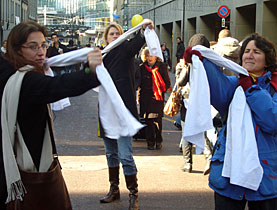Gaps found in research on domestic violence

Domestic violence is common in Switzerland, its causes are complex and increased efforts are needed to prevent violent behaviour, experts say.
An extensive study into the reasons for such violence and possible measures against it calls for improved coordination among the authorities, further scientific research and political action.
Precise figures on violence in relationships are not available but surveys found that between ten to 20 per cent of adult women experience physical aggression.
“It is a widespread phenomenon,” said Patricia Schulz of the Federal Gender Equality Office at a news conference on Thursday.
More reliable information is not expected before data from the cantonal police forces is published in a nationwide survey from next year onwards.
But specialists believe a considerable number of cases will never come to light.
Domestic violence is not limited to particular groups or levels of society, although the reported cases suggest that low income or poor living conditions can be among the factors involved.
“Violence is not due to a single cause. It is a multitude of factors,” said psychologist Marianne Schär Moser, who led the study.
Conclusions
She warned against making hasty conclusions.
“Statistics show a greater prevalence of violence among foreign or bi-national couples, but it is wrong to assume that the nationality is a major factor.”
Schär added that the deeper causes of aggression are very difficult to identify.
“A difficult childhood or transitional periods in an relationship, such as a pregnancy, or a separation, or the social isolation of a couple seems to be linked to incidents of domestic violence.
“But they are not determining issues.”
She pointed out that alcohol or unemployment are risk factors and are sometimes used as an excuse to beat the partner.
Police, doctors
The authors of the report highlight the progress made over the past ten years, notably by tightening legal standards and by training security forces.
Police forces have made great efforts to learn how to cope with cases of domestic violence, although among other professions the level of competence varies from region to region, the study found.
“Doctors could play a very important role in prevention and early diagnosis of cases of violence,” said Schulz.
She also called for increased awareness of domestic violence among judges in Switzerland’s 26 cantons.
For her part, Schär said she was surprised to see how many counselling services there are across the country, but how little they have so far been cooperating with each other.
“We hope that this report can help all parties involved in the different cantons to learn from each other,” she said.
Prevention
Schär is convinced that further efforts are necessary, particularly in the field of prevention – for instance in schools.
She urged the authorities to maintain the level of assistance for both victims and perpetrators and called for more scientific research on the subject.
“We also need a study about violence of women against men and violent behaviour among homosexual couples,” Schär said.
Schulz added that domestic violence is no longer such a taboo as it was a decade ago, not least because since 2003 it has been classed as a criminal offence. This means the public prosecutor can institute proceedings, rather than depending on the victim’s willingness to take action.
“It is never easy for a victim of domestic violence to come forward, but it has been made a little bit easier,” she said.
Urs Geiser, swissinfo.ch
Up to one in five women in Switzerland falls victim to domestic violence – physical or sexual aggression, according to official estimates.
Up to two out of five have faced mental abuse.
22 women and four men died on average as a result of domestic violence between 2001 and 2004.
In 2003 domestic violence was made an offence for which proceedings are brought directly by the public prosecutor.
Measures, including constraining orders can be imposed against perpetrators, as part of a new clause in the civic law which took effect in 2007.
Switzerland is combating domestic violence at national and cantonal levels.
A person is considered to be in a situation of domestic violence if his or her physical, mental or sexual integrity is threatened or violated by someone in the family circle, or a present or past partner.
Domestic violence is characterised by violence or threats of violence, but also by repeated insults or harassment.

In compliance with the JTI standards
More: SWI swissinfo.ch certified by the Journalism Trust Initiative















You can find an overview of ongoing debates with our journalists here . Please join us!
If you want to start a conversation about a topic raised in this article or want to report factual errors, email us at english@swissinfo.ch.